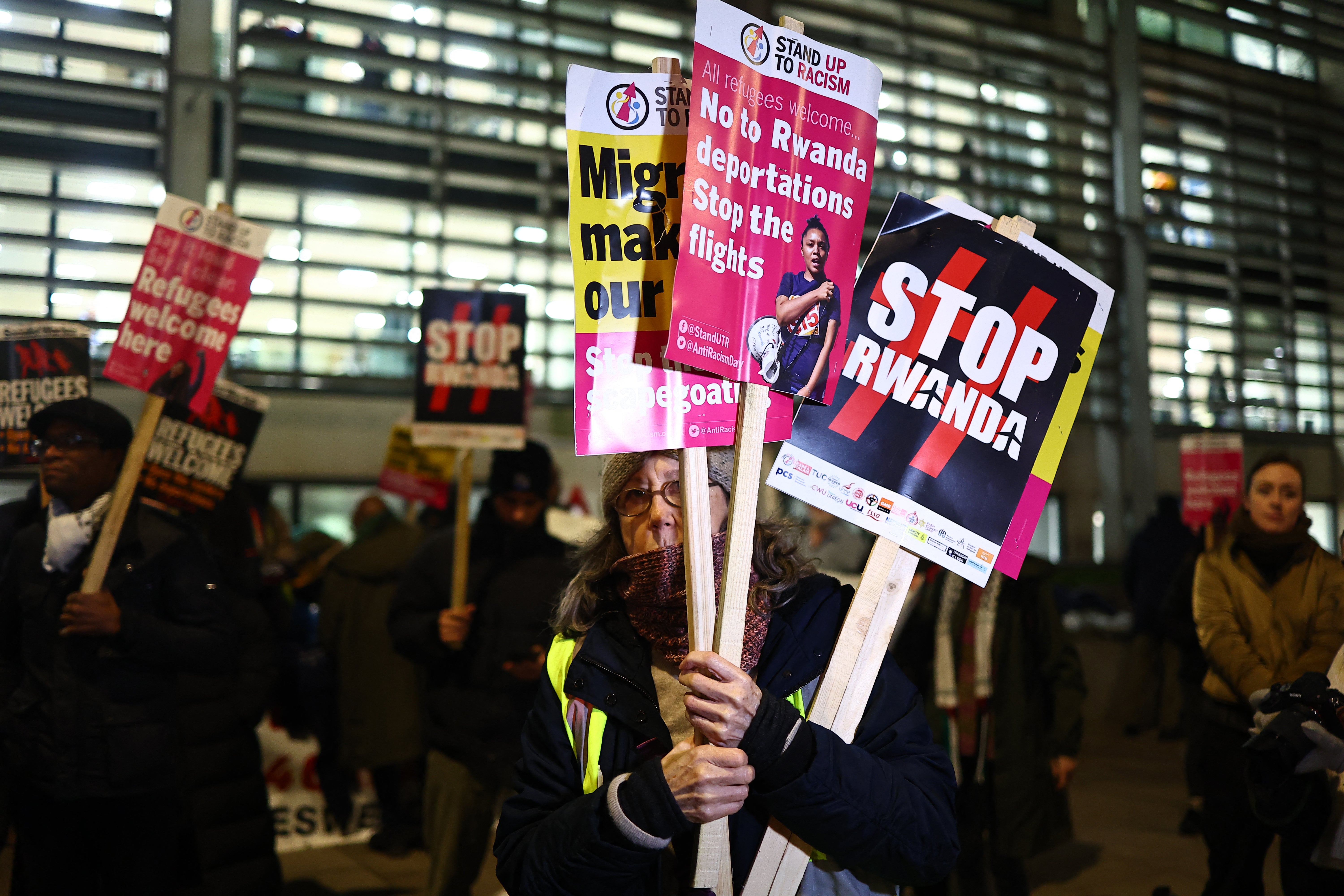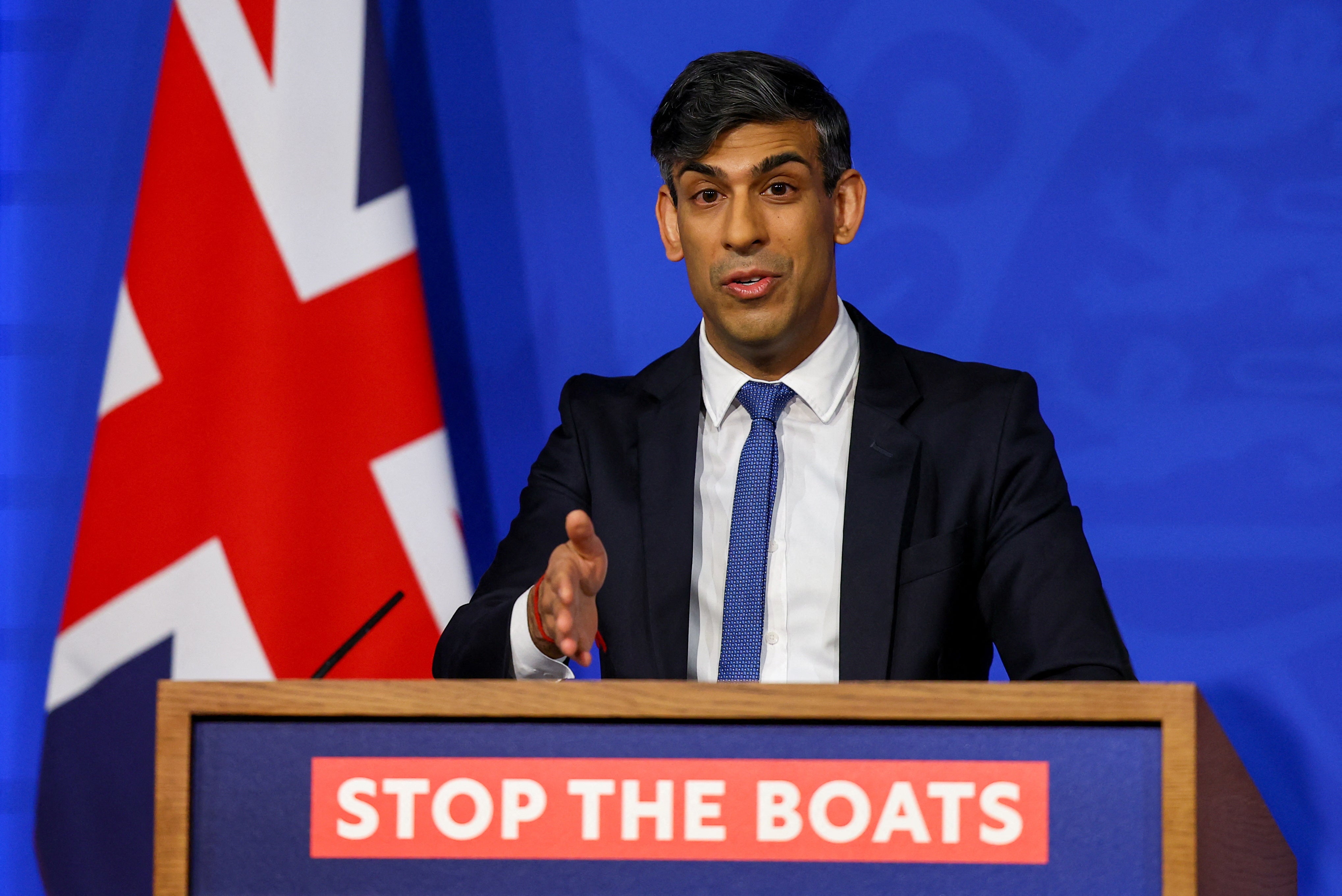Victims of torture and trafficking rounded up for Rwanda deportation under Tory scheme, report finds
Migrants speak about being suddenly detained for removal to Rwanda in new charity report
Victims of torture and trafficking, including women, were rounded up for deportation to Rwanda before the election, a report from a medical rights charity has found.
80 per cent of the people assessed by charity Medical Justice had been victims of torture, trafficking or serious ill-treatment, research published on Wednesday revealed.
Medical Justice supports migrants who are in immigration detention and the report is based on the casefiles of 30 of their clients who were detained for Rwanda. They were taken into detention between 29 April and 4 May 2024.
11 people were referred to the Home Office as suspected victims of trafficking on their detention or within the first few days. Nine people were accepted by the Home Office as having evidence of torture, according to documents reviewed by Medical Justice.
During the detentions, the Home Office filmed one person being arrested and then used this footage on social media channels. According to the charity’s report, this migrant was a torture survivor and had believed that the film camera was a gun.
Two people were also recorded as having lost consciousness or having collapsed during the detention operation, which was named ‘Operation Vector’ by the Home Office. Both were transferred to A&E and then on to the detention centre.
The operation involved around 800 officers in locations all around the country. Migrants, who had received a ‘notice of intent’ that the government was considering their removal to Rwanda, were handcuffed and taken to detention centres.
Researchers found a high amount of distress among the migrants. Of 11 people that Medical Justice clinicians assessed, all were found to have mental health conditions, nine had suicidal thoughts, two self-harmed and one attempted suicide shortly after being detained.

People were held in detention for up to 50 days, the report found. The charity said that, of those people who they had medical records for, less than half (48 per cent) saw a GP within 24 hours of arrival at the detention centre.
One person did not see a GP at all during their detention, and others had to wait up to 20 days before they did, the report said.
The migrants Medical Justice supported were from Syria, Eritrea, Ethiopia, Afghanistan, Iran, Iraq, Kuwait, Sudan and Vietnam. The majority were male but six were female.
Despite then-prime minister Rishi Sunak confirming on May 23 that no flight to Rwanda would take off before the election on July 4, migrants were not immediately released. It took until June 17 for all Medical Justice’s clients to be freed.
The report, published on Wednesday, also described the experience of being rounded up and taken to detention. One torture survivor, named Ahmad, was in his bed when four people entered his room.

One person was carrying a shield, and one was carrying what he thought was a gun, the report detailed.
His detention was later shared by the Home Office on social media. Ahmad told researchers that he had been scared and confused as he was put into handcuffs and taken from the room.
Another migrant, known as Joanna, was detained the day that she was supposed to take an English exam at college. She had been fasting that day and only had her handbag with her.
She was detained at her weekly reporting appointment with the Home Office, just before she was to head to college. She was held in a locked room where she fainted and she was then taken to A&E, the report explained.
Another person, Serena, said that she had asked a member of staff on arrival when she would be able leave detention and they had replied: “You’ll see the outside when you’re in Rwanda”.
The charity also raised concerns about whether the mental health deterioration of people in detention was communicated to the Home Office. One GP had documented that a migrant, named Hussain, had been experiencing suicidal thoughts while in detention. However the GP concluded that they did not have any “current concerns” about Hussain’s mental health.
Read more: Syrian refugee detained for 25 days for Rwanda flights speaks after release
In the case of a migrant called Emmanuel, he had been self-harming in detention and was referred to the mental health team. However the GP concluded that the did not show “signs of decline” and was “stable”.
The report comes as the chairwoman of the Brook House inquiry said that the government has agreed to just one of the 33 recommendations made to prevent a repeat of the abuse experienced by migrants in the immigration centre scandal.
An inquiry into the detention centre near Gatwick airport found that there had been 19 incidents of mistreatment against detainees over a five-month period in 2017.
A Home Office spokesperson said: “The new government inherited an asylum system failing in every aspect. It’s important to have an immigration system that is control and managed so the system is fair. The public rightly expect us to maintain a firm and fair immigration system, in which detention plays a role in enabling the removal of individuals who include serious, violent and persistent foreign national offenders.
“We remain committed to ensuring safety and security in all immigration removal centres.”
If you are experiencing feelings of distress, or are struggling to cope, you can speak to the Samaritans, in confidence, on 116 123 (UK and ROI), email jo@samaritans.org, or visit the Samaritans website to find details of your nearest branch. If you are based in the USA, and you or someone you know needs mental health assistance right now, call or text 988, or visit 988lifeline.org to access online chat from the 988 Suicide and Crisis Lifeline. This is a free, confidential crisis hotline that is available to everyone 24 hours a day, seven days a week. If you are in another country, you can go to www.befrienders.org to find a helpline near you
Join our commenting forum
Join thought-provoking conversations, follow other Independent readers and see their replies
Comments